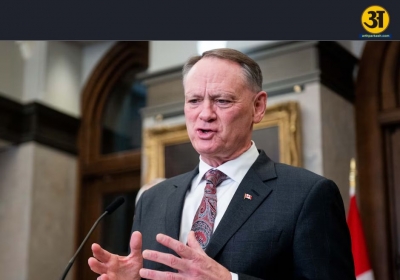
China Uncovers Alleged Espionage Case Involving CIA Operative
China Uncovers Alleged Espionage Case Involving CIA Operative and Implements New Anti-Espionage Measures, Impacting U.S. Businesses
- By Anubhuti --
- Friday, 11 Aug, 2023
China Uncovers Alleged Espionage Case Involving CIA
China announced on August 11 that it has uncovered a case of alleged espionage involving a Chinese national named Zeng and the U.S. Central Intelligence Agency (CIA). This revelation comes as part of China's ongoing efforts to counter spying activities and enhance its national security measures. The case centers around accusations that Zeng provided "core secret information" to the CIA in exchange for monetary compensation, shedding light on the intricate world of international intelligence operations.
Espionage Allegations and Details of the Case
The Chinese government asserts that Zeng, a 52-year-old individual, was sent to Italy for educational purposes, where he established a connection with a CIA agent stationed at the U.S. embassy in Rome. This alleged acquaintance led Zeng down a path of clandestine activity, as he is said to have been persuaded to share sensitive information about the Chinese military with the CIA. In return for his cooperation, Zeng was promised a substantial financial reward and assistance for himself and his family to relocate to the United States.
Also Read:
Reports suggest that Zeng formalized this arrangement by signing a contract with the U.S. side. He reportedly underwent training before returning to China to carry out the espionage activities outlined in the agreement. The case quickly gained widespread attention within China, as it became a top trending topic on the social media platform Weibo. While no specific details about Zeng's punishment were provided, this incident highlights the complexities and potential consequences associated with international espionage.
Impact of China's Revised Anti-Espionage Law on U.S. Businesses
The announcement of the alleged espionage case coincides with China's recent implementation of a revised anti-espionage law, which has raised concerns among U.S. businesses operating in the country. This updated law grants authorities increased power to address threats to national security, potentially affecting routine business activities. Under the revised law, actions such as "relying on espionage organizations and their agents" or unauthorized acquisition of materials related to national security can be categorized as espionage offenses.
U.S. companies have expressed apprehension over potential consequences, fearing that their standard business practices could inadvertently be classified as espionage-related activities. Craig Allen, President of the U.S.-China Business Council, highlighted concerns that the broad application of the law without clear criteria could undermine business confidence in China's market. As relations between the United States and China continue to face challenges, the implications of the revised anti-espionage law for U.S. businesses underscore the complexity of maintaining economic ties amid evolving security measures.
In conclusion, the alleged espionage case involving Zeng and the subsequent implementation of China's revised anti-espionage law reflect the ongoing efforts by both countries to navigate the intricate landscape of national security and intelligence activities. These developments raise questions about the potential impact on diplomatic relations and business operations, emphasizing the need for clear and balanced approaches to addressing security concerns without unduly disrupting economic cooperation.
Also Read:





